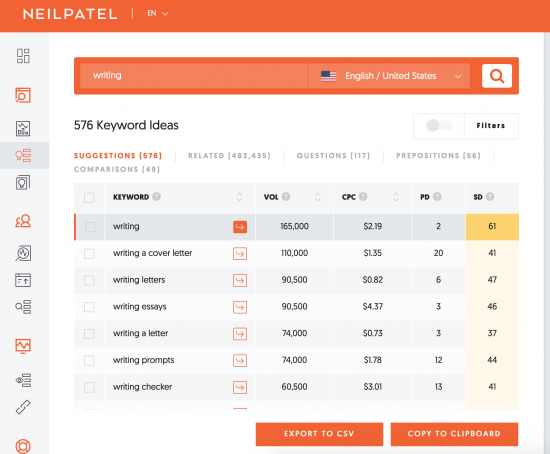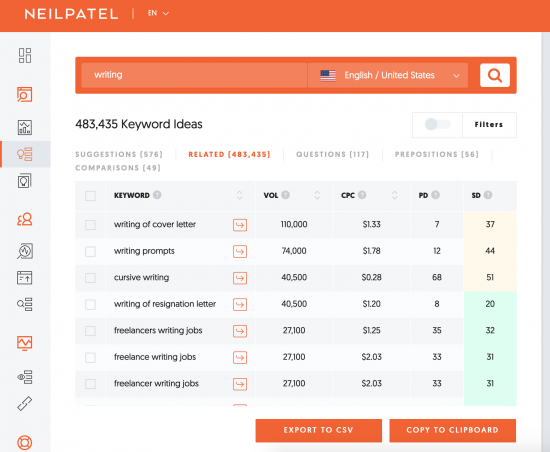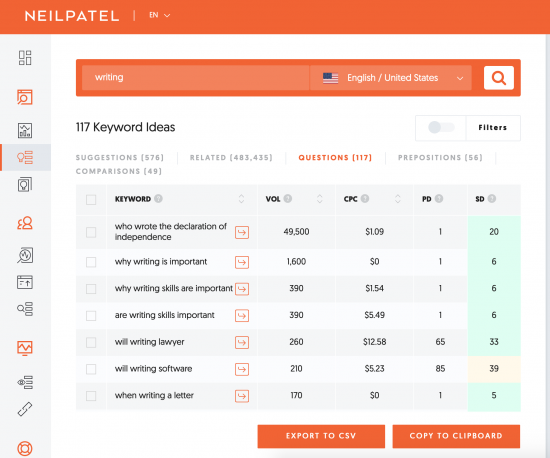Content doesn’t write itself, even if AI’s are getting smarter. The human element is a must have for quality content marketing and that presents a problem: it also requires human based research.
Nothing is inherently wrong with that fact. But you cannot deny it adds a sharp curve to the difficulty of the process. Keyword research is one of the more time consuming and complicated aspects to consider.
To try and simplify the process, numerous tools have been launched to make it streamlined. Some of these tools are more difficult to learn and use than others. That puts a lot of people off – at least those that aren’t so embroiled in the industry that analytics are their primary concern.
I wanted to take today to discuss one of those tools that airs on the side of simplicity. It is a tool that can be used by anyone at any level in order to craft a solid content marketing plan and editorial calendar. While it is far from the only one you will need, it might be a good place to start.
Ubersuggest
Developed by Neil Patel, a name most reading this article will have probably heard of, Ubersuggest is a traffic generation tool that gives you simplified data to help you find the marketability in your SEO. One of the primary focuses seems to have been maximizing results while keeping in mind your budget, which we will get to in this review.
First, let’s take a look at how it works.

For all the keyword suggestions it generates, the tool gives you a series of information to draw from:
- Search Volume – This is how many times every month someone out there is searching out the keyword you have chosen. ‘Real estate’ has a search volume of 450,000 at the time of this writing and that is marked as high.
- SEO Difficulty – This is a number that represents how difficult it will be to break into the SEO channel that this keyword possesses. The higher the number, the bigger the challenge. If you click on it, it will give you a list of related, long tail keywords that narrow it down and give you lesser difficulty scales. For instance, ‘real estate’ is a 52. But ‘real estate investment trust’ is a 27. Depending on your audience, you may be able to use this number to corner an SEO channel that hasn’t been as heavily saturated.
- Paid Difficulty – This estimates how difficult it will be to break into the paid SEO portion and this is where the budget model comes in. When creating content and especially when marketing it, you want to spend as little money as possible and that means having a decent expectation of the competition. ‘Real estate’ is listed as easy, possibly due to its wide applications.
- Cost Per Click (CPC) – This one is self explanatory. Anyone who is using paid Google ads knows that a fine balance has to be struck between how much you are willing to pay and what the eventual payoff of that investment will be. Logically, we know that the more it costs, the more it is going to be valuable in the long run. But we don’t all have the funds on bigger businesses and corporate forces and so have to find an acceptable medium that will bring in that ad revenue above or at level with the engagement it creates.
In addition to these features, you can see the number of people who are actually clicking SEO results based around the keyword and the age of the demographic most likely to pay attention.
If you have already established your most valuable target audience, this feature can help to legitimize – or change – that expectation. You may find that you are able to establish multiple keywords that will widen your range and still be relevant, without casting too broad a net.
“Related Keywords”

The next feature I want to discuss is the categories function. This is a great way of narrowing your chosen keyword but also widening the scope of what keywords you may be missing. Suggestions is the main category and the one that most people stick to. It works based entirely on what info you input in your search. This will give you a good overview of the above data, as well as content suggestions for actual titles you might use and tweak. If you are dead set on a specific set of keywords, this is a simple way to get yourself some good content ideas.
If you want to widen your horizons, I would suggest checking out the other features. Related will give you similar or connected keywords and content ideas that are more open than the one you searched for. Some that I got with ‘commercial real estate’ and an article suggestion was, “These 28 real estate photos prove that selling a house is more challenging than you think”.
Niche Question Research

Obviously, this will be a great one for SERPS and getting you ready for Google’s latest way of providing search results at the top of every page. You will also often find that these have less competition and are easier to target, killing two birds with one stone.
Last, we have Prepositions and Comparisons., The first will link two concepts together for a more precise version of your keyword. For instance, ‘Is real estate a good investment?” The last takes a look as comparison keywords, like ‘real estate versus stocks’.
Ubersuggest has many more cool featured, like analyzing competitors’ best-performing keywords, providing at-a-glance SERP and domain analysis, and even backlink research.
This collection of features makes Ubersuggest an interesting tool that is worth looking into. But more important, it is the most newbie-friendly tool out there. If you are a writer or a blogger, like myself, you’ll appreciate its rich functionality which doesn’t require any extra training to figure out.
To start playing with the tool, you don’t have to register or pay, so go ahead and give it a try!
- Why I Blog, and Why You (and Your Business) Should Too - September 27, 2024
- How To Promote Your Ebook On Twitter - May 30, 2024
- How to Print Your Social Media Memories - March 7, 2024
- How to Boost Sales with Social Media - August 1, 2023
- 5 Community Building WordPress Plugins - May 16, 2022
- 5 SEO Tips For Blogging And Content Creation - February 21, 2022
- Facebook Video Ads and Your Small Business: 6 Tips to Help You Win New Audiences - November 1, 2021
- Google and Data Security - September 23, 2021





